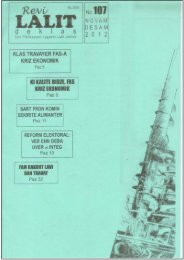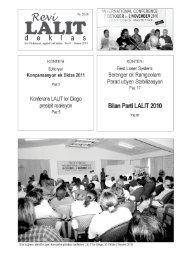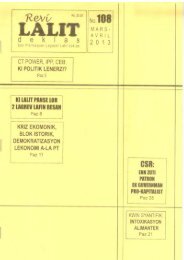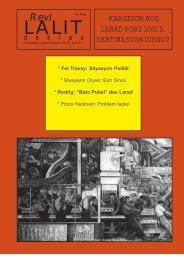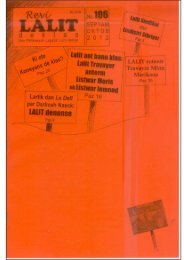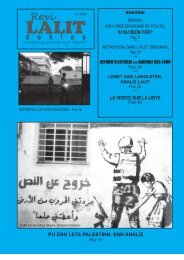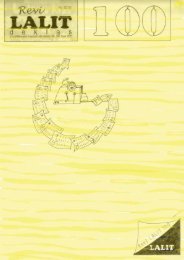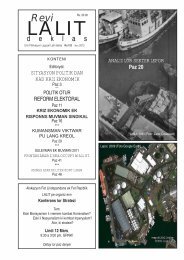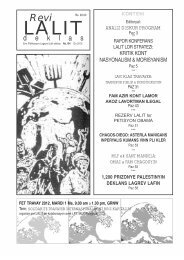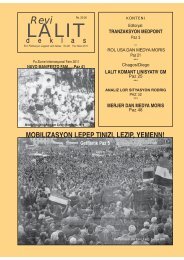Against communalism of the best-loser system - Lalit Mauritius
Against communalism of the best-loser system - Lalit Mauritius
Against communalism of the best-loser system - Lalit Mauritius
You also want an ePaper? Increase the reach of your titles
YUMPU automatically turns print PDFs into web optimized ePapers that Google loves.
a) <strong>the</strong> auto-classification <strong>of</strong> all candidates into four communities defined by law in racereligious<br />
terms – subject to Supreme Court decision as to a candidate’s ‘community’ in <strong>the</strong> case<br />
<strong>of</strong> any dispute – and this still goes on today; and<br />
b) <strong>the</strong> classification <strong>of</strong> <strong>the</strong> whole population through <strong>the</strong> 10-yearly government Population<br />
Census. In 1982, <strong>the</strong> MMM, under popular pressure changed <strong>the</strong> Constitution so that citizens<br />
are no-longer required to be classified by future Censuses for <strong>the</strong> purposes <strong>of</strong> <strong>the</strong> <strong>best</strong> <strong>loser</strong>. This<br />
measure can become a progressive measure only if we now manage to do away with <strong>the</strong> o<strong>the</strong>r<br />
half <strong>of</strong> <strong>the</strong> obligatory classification i.e. end obligatory classification <strong>of</strong> candidates for <strong>the</strong><br />
National Assembly elections. The Constitution now still requires that <strong>the</strong> population continue to<br />
be classified for <strong>the</strong> purposes <strong>of</strong> <strong>the</strong> <strong>best</strong>-<strong>loser</strong> nominations by “reference to <strong>the</strong> results <strong>of</strong> <strong>the</strong><br />
published 1972 census <strong>of</strong> <strong>the</strong> whole population <strong>of</strong> <strong>Mauritius</strong>” (Constitution First Schedule 5(8).<br />
c) As part <strong>of</strong> our protest against <strong>the</strong> <strong>best</strong> <strong>loser</strong> <strong>system</strong> and its odious classification <strong>of</strong> human<br />
beings, <strong>Lalit</strong> candidates all drew <strong>the</strong>ir respective communities out <strong>of</strong> a hat (thus classifying<br />
candidates by ‘chance’) when our party put up 15 candidates in 1983 and <strong>the</strong>n 42 candidates in<br />
1987. O<strong>the</strong>rwise, if we had not done this, our Nomination Papers would not have been valid.<br />
In 1995, <strong>the</strong> Movement <strong>Against</strong> Communalism (MAC) representing a broad front <strong>of</strong> social,<br />
political and trade union currents, brought out <strong>the</strong> two most far-reaching booklets on <strong>the</strong><br />
communal corruption <strong>of</strong> <strong>the</strong> electoral <strong>system</strong>. These two texts, read toge<strong>the</strong>r, are <strong>the</strong> only really<br />
thorough analyses <strong>of</strong> this communal aspect <strong>of</strong> <strong>the</strong> Mauritian Constitution and Mauritian<br />
electoral <strong>system</strong>.<br />
In <strong>Lalit</strong>, we believe that any new debate for <strong>the</strong> introduction <strong>of</strong> proportional representation must<br />
begin with <strong>the</strong> removal <strong>of</strong> <strong>the</strong> vestigial call for race and religious ‘classification’ by <strong>the</strong> state <strong>of</strong><br />
candidates in <strong>the</strong> Best Loser System.<br />
The removal <strong>of</strong> <strong>the</strong> communal <strong>best</strong>-<strong>loser</strong> <strong>system</strong> will thus permit everyone in <strong>Mauritius</strong> to begin<br />
to see “proportional representation” as <strong>the</strong> representation <strong>of</strong> different political currents and <strong>of</strong><br />
different opinions and ideas, and not <strong>the</strong> perpetuation <strong>of</strong> <strong>the</strong> first wave <strong>of</strong> proportional<br />
representation which was <strong>the</strong> desire to institutionalize <strong>the</strong> colonial/slave-owners’ ideology <strong>of</strong><br />
race classification. The basis <strong>of</strong> <strong>the</strong> existing <strong>best</strong> <strong>loser</strong> <strong>system</strong> is that an elector can be<br />
represented across <strong>the</strong> board by anyone from <strong>the</strong> same supposed group as he or she, regardless<br />
<strong>of</strong> <strong>the</strong> ideas <strong>of</strong> ei<strong>the</strong>r elector or candidate.<br />
<strong>Lalit</strong> is against any introduction <strong>of</strong> proportional representation for different political currents<br />
unless at <strong>the</strong> same time, <strong>the</strong> institutionalized <strong>communalism</strong> <strong>of</strong> proportional representation by<br />
race and community (i.e. <strong>the</strong> <strong>best</strong> <strong>loser</strong> <strong>system</strong>) is removed from <strong>the</strong> statute books. O<strong>the</strong>rwise<br />
<strong>the</strong> introduction <strong>of</strong> new forms <strong>of</strong> proportional representation (on top <strong>of</strong> <strong>the</strong> existing <strong>best</strong> <strong>loser</strong><br />
<strong>system</strong>) will fan <strong>the</strong> fires <strong>of</strong> an already communalized political scene.<br />
What we propose in <strong>the</strong> context <strong>of</strong> <strong>the</strong> debate<br />
We propose that 63 Members <strong>of</strong> <strong>the</strong> National Assembly are elected in 21 constituencies (three<br />
for Rodrigues), and a fur<strong>the</strong>r 12 Members are nominated in <strong>the</strong> following way as “<strong>best</strong> <strong>loser</strong>s”<br />
or “additional members” on different party lists.<br />
All parties with more than 5% <strong>of</strong> total votes cast are eligible. All parties submit to <strong>the</strong> Electoral<br />
Commissioner before <strong>the</strong> election a list <strong>of</strong> 12 <strong>of</strong> <strong>the</strong>ir candidates, in <strong>the</strong> order <strong>the</strong>y choose, for<br />
<strong>the</strong>ir first <strong>best</strong> <strong>loser</strong>s to be taken from.<br />
The same procedure as <strong>the</strong> present <strong>best</strong> <strong>loser</strong> <strong>system</strong> is used for establishing which parties need<br />
how many additional members. Once <strong>the</strong> numbers are calculated, <strong>the</strong>n <strong>the</strong> nominations are done<br />
by <strong>the</strong> Electoral Commission, naming from <strong>the</strong> order submitted by <strong>the</strong> party, and if all 12 are<br />
already elected or nominated, <strong>the</strong>n proceeding by naming <strong>the</strong> candidate with <strong>the</strong> highest<br />
percentage amongst those in that party who were not elected.<br />
However, any party with an absolute majority <strong>of</strong> seats after <strong>the</strong> first past <strong>the</strong> post exercise, will<br />
receive enough additional members so as to retain its absolute majority.<br />
As soon as <strong>the</strong> Nominations are done, or within x hours, <strong>the</strong> National Assembly votes for<br />
Ministers, and immediately <strong>the</strong> Cabinet votes for a Prime Minister.<br />
We propose that it be <strong>the</strong> speaker from <strong>the</strong> last National Assembly who presides for <strong>the</strong> election<br />
<strong>of</strong> <strong>the</strong> Cabinet and until he is replaced at <strong>the</strong> first substantive sitting, and that it is <strong>the</strong> President<br />
<strong>of</strong> <strong>the</strong> Republic who presides <strong>the</strong> meeting <strong>of</strong> <strong>the</strong> Cabinet at which <strong>the</strong>re is an election <strong>of</strong> Prime<br />
Minister.



